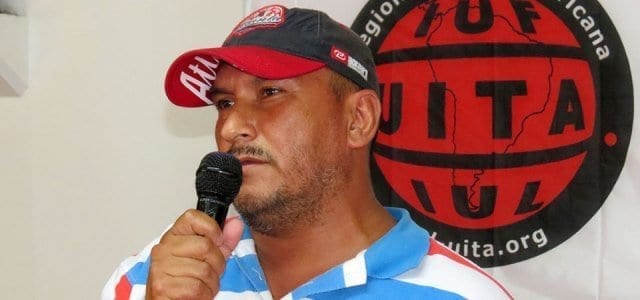
Jul 6, 2017
The president of a local branch of Colombia’s National Union of Agricultural Workers (SINTRAINAGRO) was fatally shot by gunmen on a motorcycle on July 1 while watching his son play soccer.
Alberto Román Acosta González led the Guacarí SINTRAINAGRO branch in Colombia’s Valle del Cauca. The Guacarí branch, along with other SINTRAINAGRO branches that represent sugar workers in the region, have been engaged in a 10-year, coordinated effort to formalize workers’ jobs and secure basic labor rights. According to Rhett Doumitt, Solidarity Center country program director, sugar workers and their unions have faced extreme violence in response to organizing efforts and their demands to end informal employment, which deprives workers of social protection and rights.
SINTRAINAGRO is an affiliate of the global food, farm and hotel union, IUF, which has written Colombian President Juan Manuel Santos to “demand a full and transparent investigation into this latest assassination and adequate measures to protect union leaders and members.” In 2013, Juan Carlos Pérez Muñoz, a union member in Colombia, was gunned down on his way to board a bus to the Cauca River Valley, where he worked in the sugarcane fields.
Last month, Colombia was listed as among the 10 worst countries for worker rights in the International Trade Union Confederation (ITUC) Global Rights Index. On June 21, a group of armed and masked men forcibly abducted and murdered Mauricio Fernando López Vélez, national vice president of the Union of Workers of Public Universities (SINTRAUNAL) and professor at Valle University, from his family’s farm in Buenos Aires, Cauca.
Up until the past few years, Colombia was the deadliest country for union leaders and members, with several thousand murdered over decades. The majority of those cases remain unsolved.
“Colombia remains one of the worst violators of trade union rights with a horrendous record for impunity regarding the murders of trade unionists,” according to the report. “Threats, violence and intimidation against trade unionists have a deep-rooted culture in Colombia and have continued apace in 2017.”
Sugarcane cutters work for up to 14 hours a day and make as little as $194 a month.
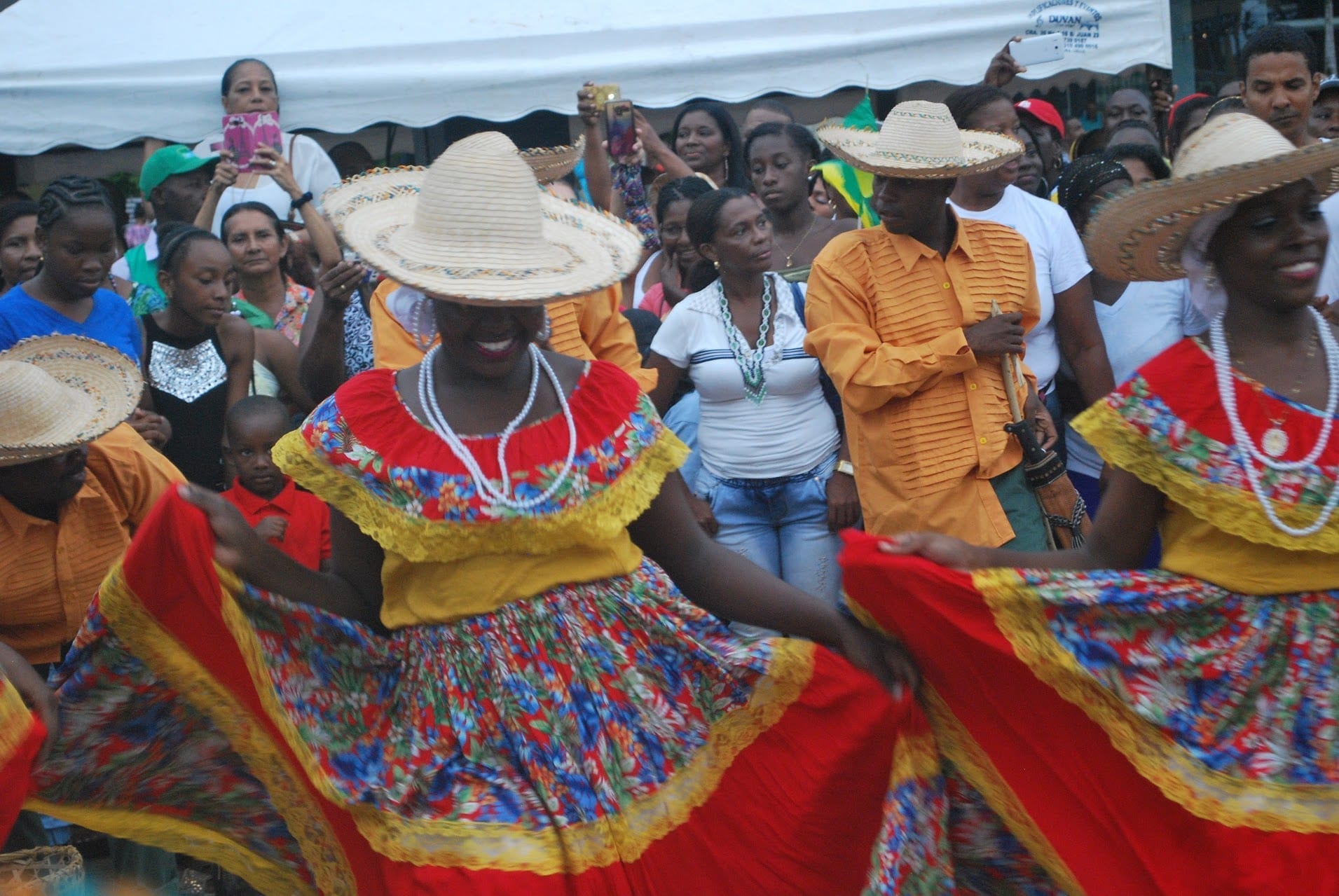
Jun 24, 2017
After 22 days of peaceful protests, workers, unions and other civil society groups in Buenaventura, the country’s largest port city, won a landmark agreement with the Colombian government. On June 6, the government agreed to invest more than $500 million in the long-neglected city over the next decade. United Nations officials, senators and local politicians witnessed the signing of the agreement. A bill securing the funding is scheduled to be submitted to Congress on July 20.
Following the agreement, the elected strike committee, representing a coalition of 66 civil society organizations in Buenaventura, suspended the civic strike for one month to assess the government’s compliance with its pledge. In the lead up to the July 20 deadline, local groups will continue to negotiate decent employment and improved water services, sanitation, healthcare, education, housing and other social initiatives.
On May 16, tens of thousands of peaceful protesters took to the streets demanding peace and dignity after years of neglect by leaders in Bogota, the capital. Many of the port city’s 400,000 predominately Afro-Colombian inhabitants live in abject poverty without access to proper hospitals, schools, roads and other basic services.
Buenaventura’s thriving port accounts for 60 percent of the country’s maritime trade and in 2014, generated $2 billion in tax revenue. Only 3 percent of that revenue is reinvested in the city.
Many residents work in the port without the protection of Colombia’s labor code. The Port Workers’ Union (Unión Portuaria) is pushing to incorporate them into a collective bargaining agreement that would establish direct, indefinite employment contracts that include a living wage and provisions for health and pension benefits.
Beginning on the fourth day of demonstrations, the peaceful protests were disrupted by a national police force crackdown, with 41 reported arrests, dozens injured and at least one death. Human rights groups condemned the government’s decision to deploy riot police against peaceful demonstrations—in a city deprived even of a local, publicly-funded security service.
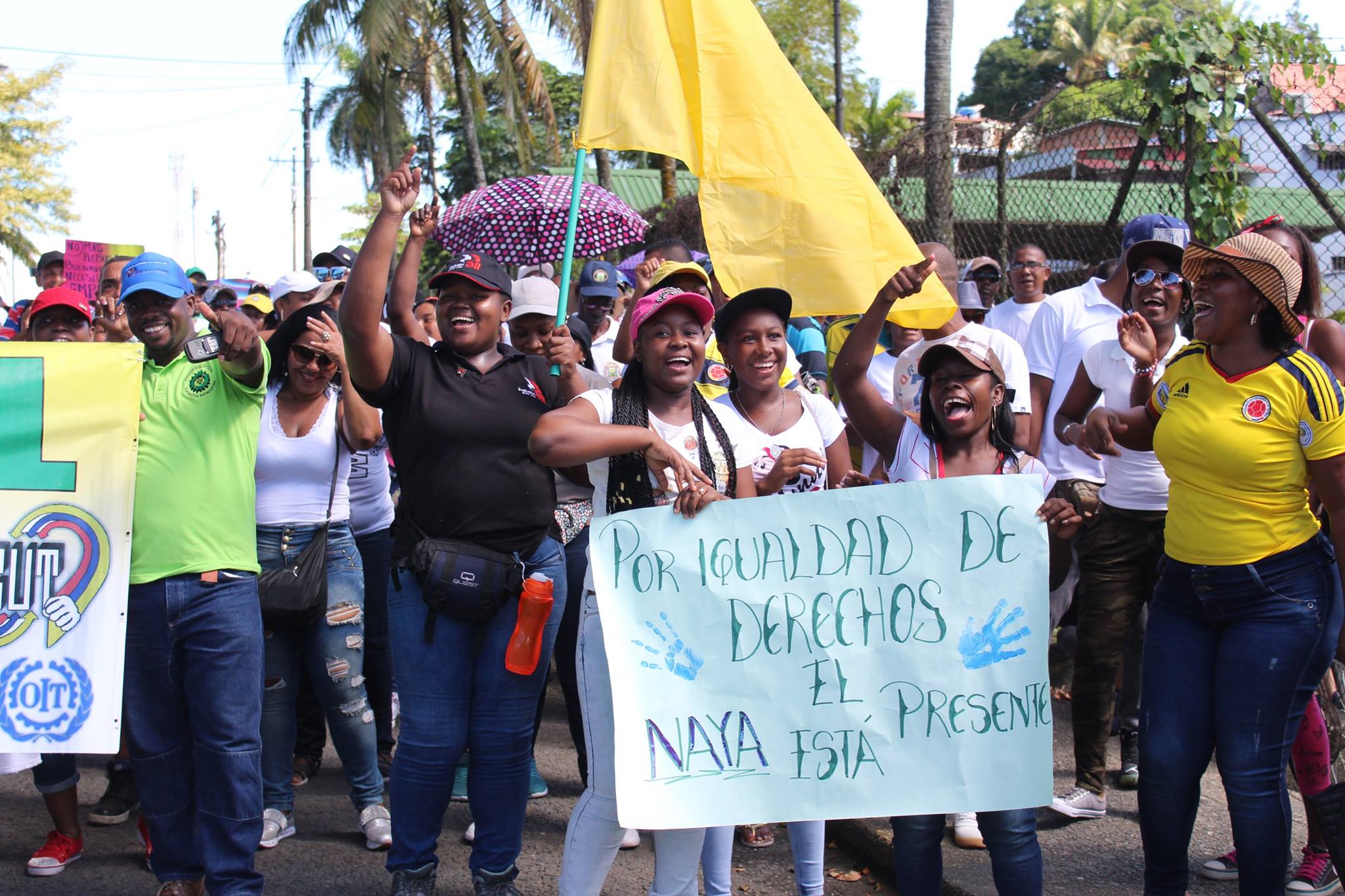
May 25, 2017
The Colombia Port Workers’ union is calling on the Ministry of Labor to follow up on promises it made during a congressional hearing this week and resume discussions with the union and the Buenaventura Port Society over formalizing 3,500 illegally outsourced workers in Buenaventura, Colombia’s largest port.
Solidarity Center union partners, organized within the Mesa Inter-Sindical coordinating body in Buenaventura, facilitated this week’s meeting in the Senate. The Solidarity Center has helped union partners to establish and build relationships with congressional allies, including Sen. Antonio Navarro, who visited the port in Buenaventura at the invitation of the port workers’ union in February.
The union (Unión Portuaria) is seeking an accord with the Port Society and government that establishes direct, indefinite employment contracts that include family-supporting wages, health care, severance, pension benefits and coverage by the union’s collective bargaining agreement.
Like the port workers, most workers in the city are classified as informal economy workers and excluded from the country’s labor protections, toiling in jobs that lack a minimum wage, workplace safety and other fundamental protections.
400,000 Residents Lack Clean Water, Electricity
Buenaventura accounts for 60 percent of the country’s maritime trade and in 2014, generated $2 billion in tax revenue. Yet the 400,000 residents, more than 90 percent of whom are of African descent, live in grinding poverty. Buenaventura residents lack even the most basic services, including access to clean water, reliable electricity and functioning sewage systems. Health care, housing and the education system are also substandard. The city’s three past mayors are in prison for embezzling public funds.
The port workers’ union, in coalition with 66 civil society organizations in Buenaventura, are also calling on the Colombian government to fulfill promises it made to residents in 2014 regarding access to basic services and decent employment. Residents have waged a civic strike in response to government inaction, bringing commerce and port operations to a halt.
Since May 16, tens of thousands of peaceful protesters have taken to the streets to demand dignity and peace. Over the weekend, police attacked the peaceful protesters, killing at least one demonstrator and injuring dozens more, including children.
Protesters vow to continue the strike until the government meets their demands, including:
- Access to basic sanitation, infrastructure, and community-run public utility services.
- Access to preventative healthcare, quality treatment and traditional medicine.
- Passage of legal and political measures to generate decent jobs, labor formalization with direct hiring relationships, and the elimination of outsourcing and employment insecurity.
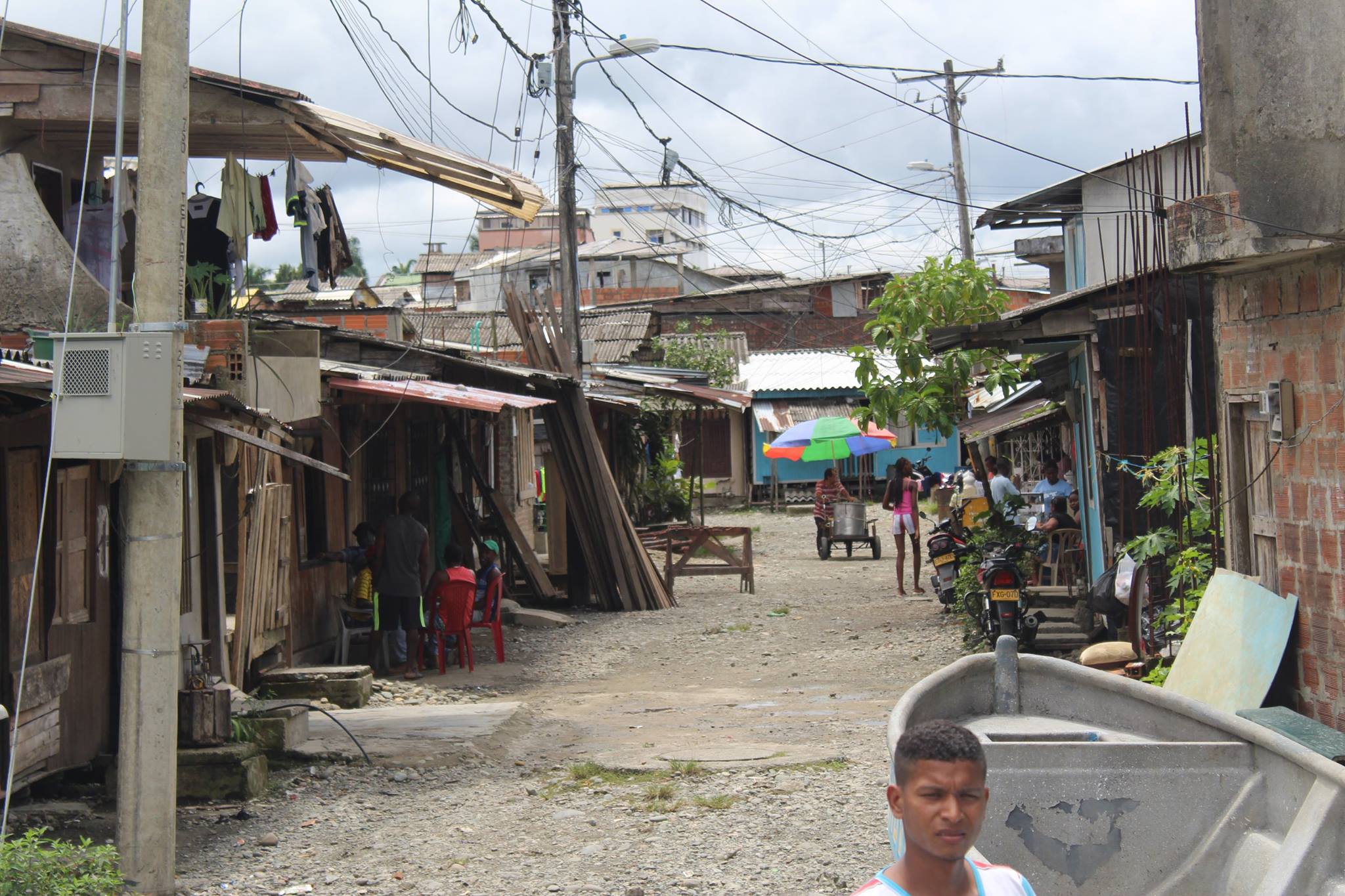
May 19, 2017
Workers in Buenaventura, Colombia, who are waging an indefinite work stoppage to call attention to the lack of jobs, good wages and basic public services in their community, have brought port operations and local commerce to a halt.
As the country’s largest seaport, Buenaventura accounts for 60 percent of the country’s maritime trade and in 2014, generated $2 billion in tax revenue. Yet residents, more than 90 percent of whom are of African descent, live in grinding poverty. The vast majority of workers toil in the city’s informal economy, most in jobs that lack a minimum wage, workplace safety and other fundamental protections, in large part because their jobs are illegally subcontracted and so excluded from the country’s labor protections. (Follow the protest on Twitter at #SomosBuenaventura)
Buenaventura residents lack even the most basic services, including potable water, reliable electricity and functioning sewage systems. The city’s already weak health system worsened in 2014 when its only public hospital closed, and now the nearest hospital for the city’s 400,000 residents is a three-hour drive away, in Cali. Housing and the education system are also substandard. The lack of economic opportunity and investment in the city have fed an environment of violence as the country attempts to emerge from a 50-year armed civil war.
Workers who attempt to form unions to improve their wages and working conditions often are threatened and fired, and unions report receiving phoned death threats from men claiming to belong to paramilitary organizations.
The current work action arises from the community-building efforts of a coalition of unions and Afro-Colombian, indigenous and student groups. In 2014, the groups first mobilized for dignity and peace.
Protests in Buenaventura coincide with work stoppages and demonstrations across Colombia, in which at least half a million people , including oil workers and salt miners in Meta and Manuare, are protesting broken promises by the national government to alleviate rampant state neglect, poverty, violence and corruption.
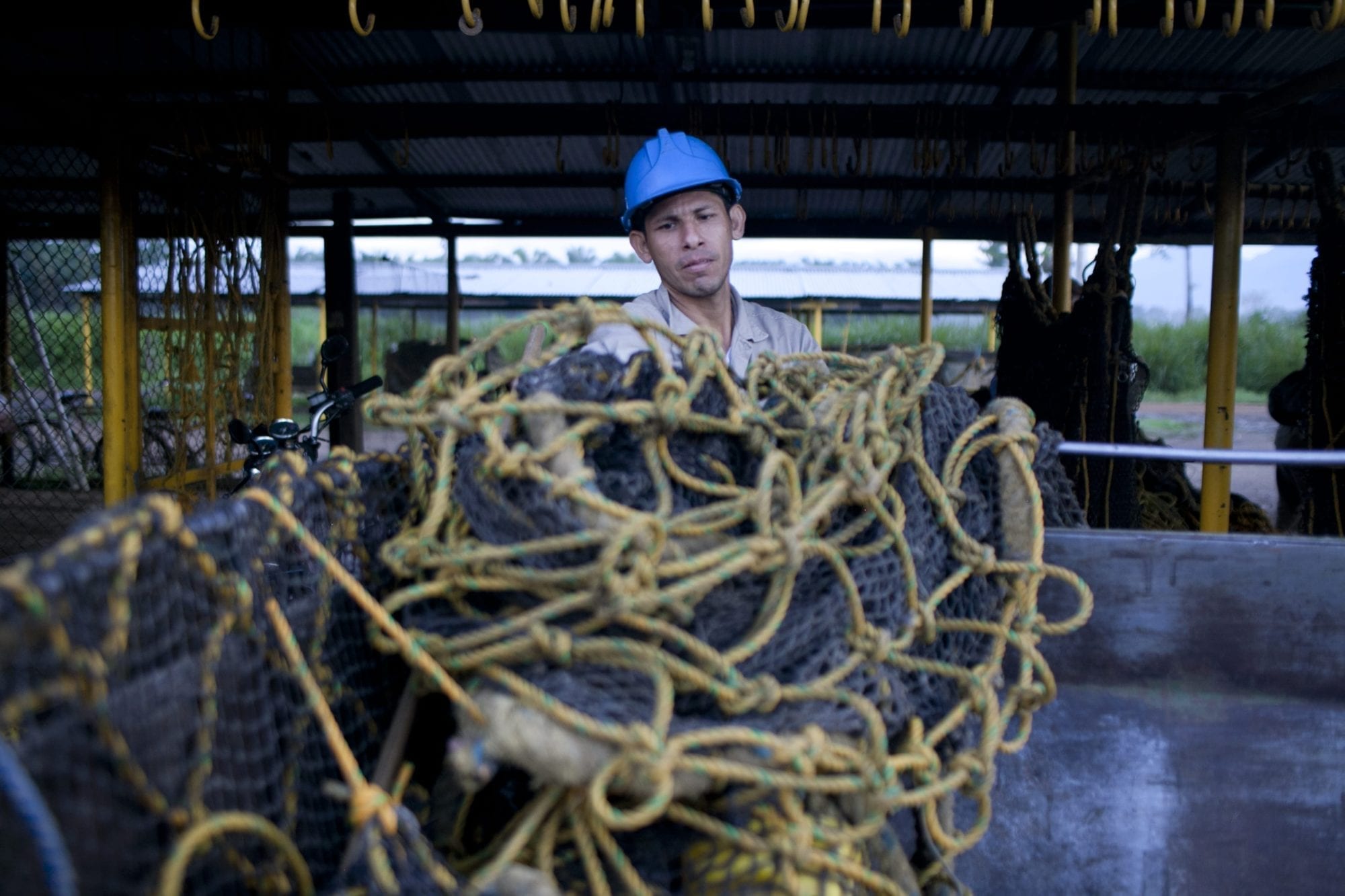
Oct 12, 2016
In the wake of Colombia’s narrow rejection of a peace accord and the subsequent bestowing of the Nobel Peace Prize on the country’s president last weekend, Colombian trade unions vowed to remain part of the process to end the Western Hemisphere’s longest war and work toward a more inclusive society.
On October 2 and to the disappointment of the Colombian labor movement, citizens narrowly rejected a deal that would have ended 52 years of war. The three national trade union centers—the Central Workers’ Union (CUT), Confederation of Colombian Workers (CTC), General Labor Confederation (CGT)—issued a joint statement reaffirming their “commitment to the peace process” and said the labor movement would continue efforts “to bring about an end to the armed conflict” in the country.
The agreement between the Colombian government and the Revolutionary Armed Forces of Colombia (FARC) took more than four years to negotiate. The accord addressed victim rights and reparations, marking a breakthrough for trade unionists, who were officially recognized as victims of the conflict.
Colombia Unions Praise Decision to Award Santos Nobel Peace Prize
In statements, the CGT, CTC and CUT also lauded the decision to award Colombian President Juan Manuel Santos the Nobel Peace Prize for his efforts to end the conflict last weekend. They expressed continued support for, and participation in, an inclusive process that will eventually lead to a sustainable peace.
In addition to ending the war, the accord could pave the way for a national decent work policy, create jobs, expand protections for union action in public spaces and bolster freedom of association rights.
Colombia was long the most dangerous country in the world for worker rights activists. Since 1977, 3,100 union activists and members were murdered, with many cases going unsolved, according to the National Union School (ENS), a Solidarity Center ally.





